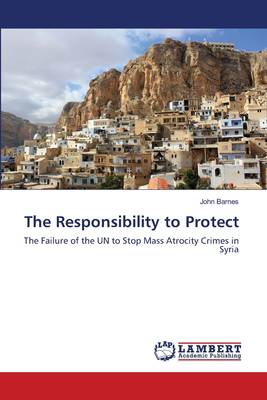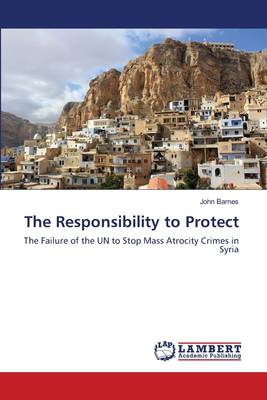
- Afhalen na 1 uur in een winkel met voorraad
- Gratis thuislevering in België vanaf € 30
- Ruim aanbod met 7 miljoen producten
- Afhalen na 1 uur in een winkel met voorraad
- Gratis thuislevering in België vanaf € 30
- Ruim aanbod met 7 miljoen producten
Zoeken
The Responsibility to Protect
The Failure of the UN to Stop Mass Atrocity Crimes in Syria
John Barnes
Paperback | Engels
€ 23,95
+ 47 punten
Omschrijving
'Never again' has been an oft-repeated refrain ever since the Holocaust by world leaders faced with responding to state sponsored mass atrocity crimes. Unfortunately, 'Never again' has been necessarily transformed to 'alas, once again' too many times since 1945. The failure of the international community to halt the horrors it knew were being perpetrated in Rwanda and Srebrenica in 1994 and 1995 respectively testify that today, as in the time of Thucydides, the 'The strong do as they can, while the weak suffer what they must.' How can the international community in the 21st century square the circle of sovereignty and human rights, allowing for humanitarian intervention in locations where state sponsored violence leaves civilians unprotected? The 'Responsibility to Protect' (R2P) is a new UN norm which ostensibly does just that, framing the intervention debate in order to catalyse action. But does R2P have any effect on the essentially self-interested character of states? This book, using three case studies, is an attempt to give an answer. It finds that due to R2P's inherent problems, its failure to catalyse action in Syria is indicative of its limitations as a viable UN norm.
Specificaties
Betrokkenen
- Auteur(s):
- Uitgeverij:
Inhoud
- Aantal bladzijden:
- 76
- Taal:
- Engels
Eigenschappen
- Productcode (EAN):
- 9783659478680
- Verschijningsdatum:
- 8/10/2013
- Uitvoering:
- Paperback
- Formaat:
- Trade paperback (VS)
- Afmetingen:
- 152 mm x 229 mm
- Gewicht:
- 122 g

Alleen bij Standaard Boekhandel
+ 47 punten op je klantenkaart van Standaard Boekhandel
Beoordelingen
We publiceren alleen reviews die voldoen aan de voorwaarden voor reviews. Bekijk onze voorwaarden voor reviews.











